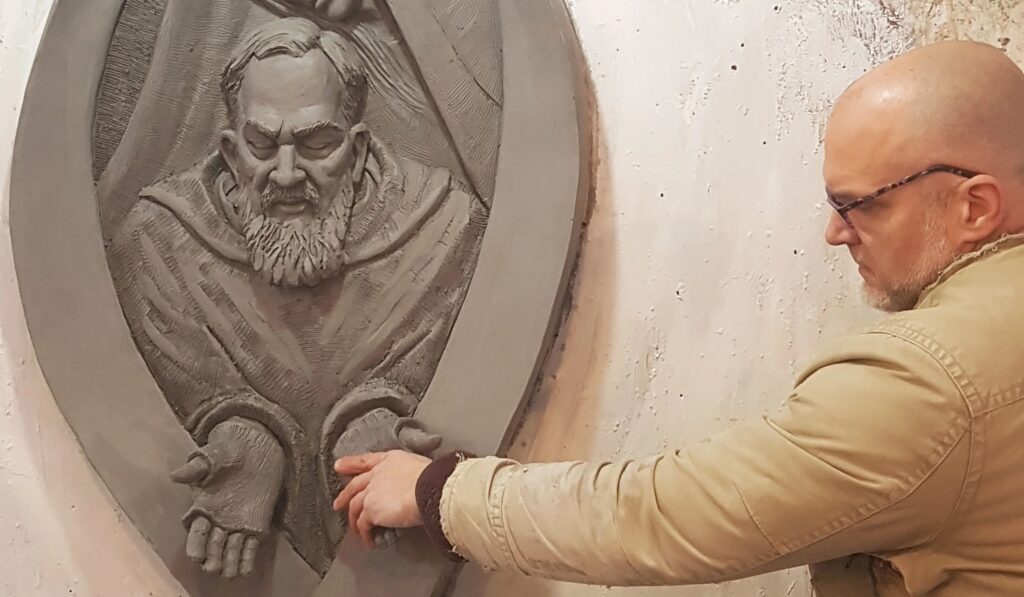Martin Barillas
Catholic News Agency
Catholic sculptor Tim Schmalz said that while Renaissance artists produced masterworks to depict the Catholic faith almost photographically, his work seeks to “go behind the scenes” and bring to life perennial truths.
A Canadian whose works are found in many countries, Schmalz, 52, recently created a massive bronze crucifix that was installed before the National Eucharistic Congress outside St. John the Evangelist Church in downtown Indianapolis, which thousands of people can see every day.
Rising from a globe, the 22-foot-tall crucifix reveals streams of blood and water flowing down from the corpus of Jesus Christ in what Schmalz describes as “spiritual striations.” These flow into a chalice and a dish that bear the Eucharist.
In an extensive interview with CNA, Schmalz said the striations streaming from the crucified Christ signify the mystery of the metamorphosis of bread and wine into the body and blood of the Lord.
“What I have to say about the artwork of previous centuries is that they didn’t have cameras. So, they believed the artwork was the camera. The benefit of having the camera today is that the artist has to work more creatively,” Schmalz told CNA.
“With where we are in the world right now, artists can experiment more. But as long as their basic underlying premise is to authentically show the eternal truths, they can’t go wrong; they’re going in the right direction,” Schmalz said about artists seeking to depict religion.
During the recently concluded National Eucharistic Congress, Schmalz was on hand to sculpt a figure featuring the Eucharist and Blessed Carlo Acutis, who was known for his devotion and his website documenting Eucharistic miracles.
Schmalz told EWTN at the Congress that while he was sculpting the head of Blessed Carlo, “one of the thoughts I had was of his curly hair and young face is that this is like Michaelangelo’s ‘David’: a young person. In a sense he is a David, and the Goliath is what he is fighting, the evil in our culture, with the holy Eucharist.”
Schmalz’s sculptures are found in several countries, including the Vatican, Spain, England, the United States, Canada, and in Pope Francis’ native Argentina, among other locales.
In the Vatican’s St. Peter’s Square Schmalz installed “Angels Unawares” — a 20-foot bronze depicting a boat full of destitute migrants watched over by an angel, while “Let the Oppressed Go free” illustrates St. Josephine Bakhita freeing the victims of human trafficking. He is also well known for “Homeless Jesus,” which depicts the Savior as a human figure, wrapped in a cloak, and resting on a park bench. Only the holes in his feet left by the Crucifixion reveal his identity. These latter three have been blessed by Pope Francis.
Schmalz’s other association with Pope Francis is his sculpture of “Our Lady, Untier of Knots,” which is a manifestation of the Virgin Mary long favored by the pope. The pontiff blessed the image during his 2022 visit to Canada at the pilgrimage site of Lac Ste. Anne.
“Ninety-nine percent of Western artwork until the last century and a half had been Christian. Why is that? It’s because the idea of the physical is embedded in Christianity unlike any other religion or philosophy. It’s the idea of God coming down into the physical being: Jesus. Another extension of that is the holy Eucharist, which takes the physical and makes it more tactile to the person,” Schmalz said.
“I’m alway looking to do something that makes people say, ‘Wow!’ and stop people in their tracks,” Schmalz said, reflecting on his more than 30 years as a sculptor.

Artist Timothy P. Schmalz touches the hands of Padre Pio in one of his sculptures. Credict: Photo courtesy of Timothy P. Schmalz (Courtesy of Catholic News Agency)
